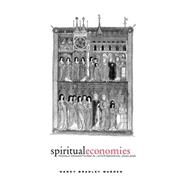Spiritual Economies
, by Warren, Nancy Bradley- ISBN: 9780812235838 | 0812235835
- Cover: Hardcover
- Copyright: 1/16/2001
From its creation in the early fourteenth century to its dissolution in the sixteenth, the nunnery at Dartford was among the richest in England. Although obliged to support not only its own community but also a priory of Dominican friars at King's Langley, Dartford prospered. Records attest to the business skill of the Dartford nuns, as they managed the house's numerous holdings of land and property, together with the rents and services owed them. That the Dartford nuns were capable businesswomen is not surprising, since the house was also a center of female education. For Nancy Bradley Warren, the story of Dartford exemplifies the vibrancy of nuns' material and spiritual lives in later medieval England. Revising the long-held view that fourteenth- and fifteenth-century English nunneries were impoverished both financially and religiously, Warren clarifies that the women in female monastic communities like Dartford were not woefully incompetent at managing their affairs. Instead, she reveals the complex role of female monasticism in diverse systems of production and exchange. Like the nuns at Dartford, women religious in late medieval England were enmeshed in material, symbolic, political, and spiritual economies that were at times in harmony and at other times in conflict with each other. Building on emerging cross-disciplinary trends in feminist scholarship on medieval religion, Warren extends ongoing debates about textual and economic constructions of women's identities to the rarely considered evidence of monastic theory and practice. To this end,Spiritual Economiesemphasizes that the cloister was not impermeable. As worldly forces such as economic trends and political conflicts affected life in the nunneries, so too did religious practices have political impact. In breaking down the convent wall, Warren also succeeds in breaching the boundaries separating the material and the symbolic, the religious and the secular, the literary and the historical. She turns to a wide range of sources--from legislative texts, court records, and financial accounts to devotional treatises and political propaganda--to explore the centrality of female monasticism to the flowering of female spirituality and to the later Middle Ages at large.







